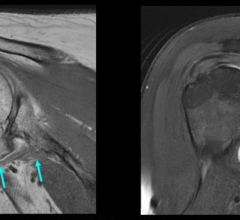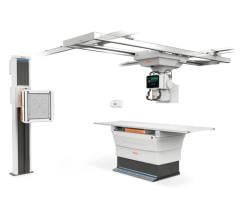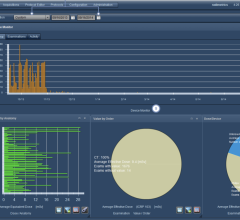
18F-FDG PET in patients with long-COVID syndrome. A and B: Transaxial sections of group averaged, spatially normalized 18F-FDG PET scans in patients with long-COVID syndrome (A) and control patients (B). C: The pattern expression score (PES; *adjusted for age and sex, for illustration purposes) of the previously established COVID-19-related spatial covariance pattern was not significantly different between patients with long-COVID syndrome and control patients. Boxplots (grey), as well as individual values for COVID-19 patients (red) and the control cohort (green), are displayed. Image created by Dressing et al., Medical Center – University of Freiburg, Faculty of Medicine, University of Freiburg, Freiburg, Germany.
November 1, 2021 — Long-term cognitive problems after a COVID-19 diagnosis may be a result of fatigue rather than pathological changes in the brain, according to a study published ahead-of-print in The Journal of Nuclear Medicine. An analysis of neuropsychological testing and 18F-FDG PET imaging showed that few or no objective impairments were observed in the cognition and brain pathology of long-COVID patients; however, many of the group suffered from subjective complaints such as severe fatigue.
The term “long-COVID syndrome” is used to describe symptoms that arise in the aftermath of a COVID-19 infection (usually defined as being present later than 12 weeks after the infection), including cognitive deficits—such as brain fog, memory loss and attention problems—as well as fatigue and exhaustion. The underlying cause of these symptoms is unknown.
Previously published studies showed that patients needing inpatient treatment because of newly diagnosed COVID-19 have reduced glucose metabolism in the brain, which is associated with impaired cognitive function. To assess whether patients suffering from long COVID experience similar deficits, researchers conducted neuropsychological testing and cerebral 18F-FDG PET imaging.
Thirty-one patients who sought counseling for persistent neurocognitive symptoms were included in the present study. Patients participated in a battery of neuropsychological tests, and the results were analyzed to determine cognitive impairment levels. Average group results of the testing showed no impairment. Mild deficits were observed in some patients on the single-subject level, however, mainly in regard to visual memory.
18F-FDG PET imaging was recommended to all patients who received counseling, and 14 of the 31 patients proceeded. Clinical assessment of each patient’s scan revealed no distinct pathological findings or alternative diagnoses. When the scans were compared to those of a control group, no significant differences were noted.
The lack of significant findings on 18F-FDG PET scans and only mild impairments on neuropsychological testing is in contrast to the severe and lasting disability self-reported by the patients. Fatigue, however, was particularly prevalent in the group, reported by 61 percent of study participants. Fatigue often follows viral infections and inflammation and has been related to immune processes and chronic fatigue syndrome in long COVID.
“This suggests that the fatigue, not brain regional dysfunction, may be responsible for many long-COVID symptoms,” the researchers concluded.
For more information: www.snmmi.org
Related Radiology COVID-19 Content:
Medical AI Models Rely on 'Shortcuts' That Could Lead to Misdiagnosis of COVID-19
CT Provides Best Diagnosis for Novel Coronavirus (COVID-19)
SNMMI Image of the Year: PET Imaging Measures Cognitive Impairment in COVID-19 Patients
Cardiac MRI Effective in Detecting Asymptomatic, Symptomatic Myocarditis in Athletes
PHOTO GALLERY: How COVID-19 Appears on Medical Imaging
VIDEO: How to Image COVID-19 and Radiological Presentations of the Virus — Interview with Margarita Revzin, M.D.
How Does COVID-19 Appear in the Lungs?


 May 17, 2024
May 17, 2024 








